Globalization's Effects on the Accounting Profession and Standards
VerifiedAdded on 2020/09/28
|6
|1328
|327
Essay
AI Summary
This essay examines the significant effects of globalization on the accounting profession and its standards. It highlights the emergence of a globalized world and the need for unified accounting systems, contrasting the Generally Accepted Accounting Principles (GAAP) and the International Financial Reporting Standards (IFRS). The paper discusses both advantages and disadvantages of globalization, including the convergence of accounting standards, the need for new skills and specializations, workplace diversity, and the impact of technological changes such as automation and cloud computing. It also addresses challenges like international compliance costs, cyberattacks, and the need for accountants to adapt by acquiring professional qualifications and soft skills. The essay emphasizes the importance of understanding the global market and adapting to changes in the accounting profession to serve clients effectively in the globalized world.
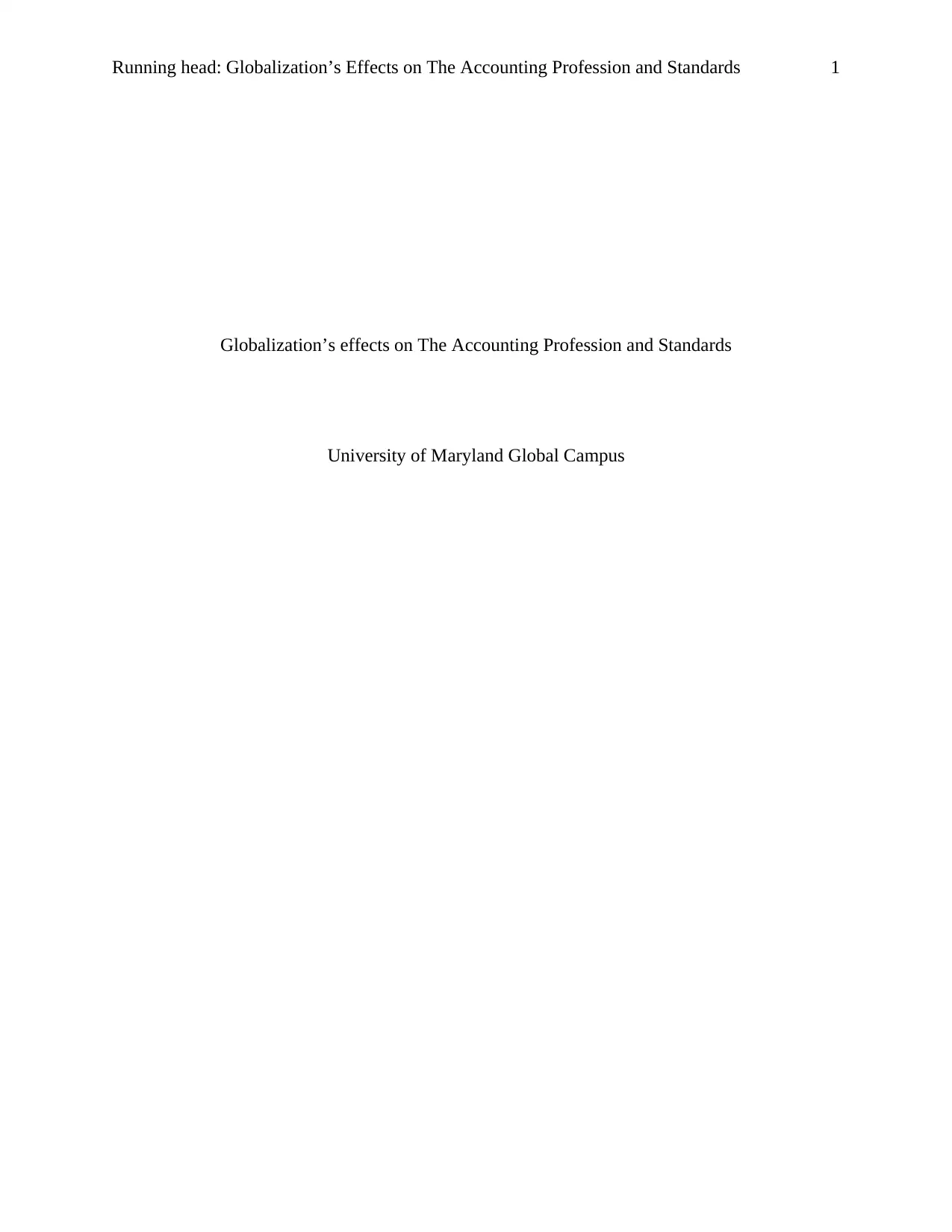
Running head: Globalization’s Effects on The Accounting Profession and Standards 1
Globalization’s effects on The Accounting Profession and Standards
University of Maryland Global Campus
Globalization’s effects on The Accounting Profession and Standards
University of Maryland Global Campus
Paraphrase This Document
Need a fresh take? Get an instant paraphrase of this document with our AI Paraphraser
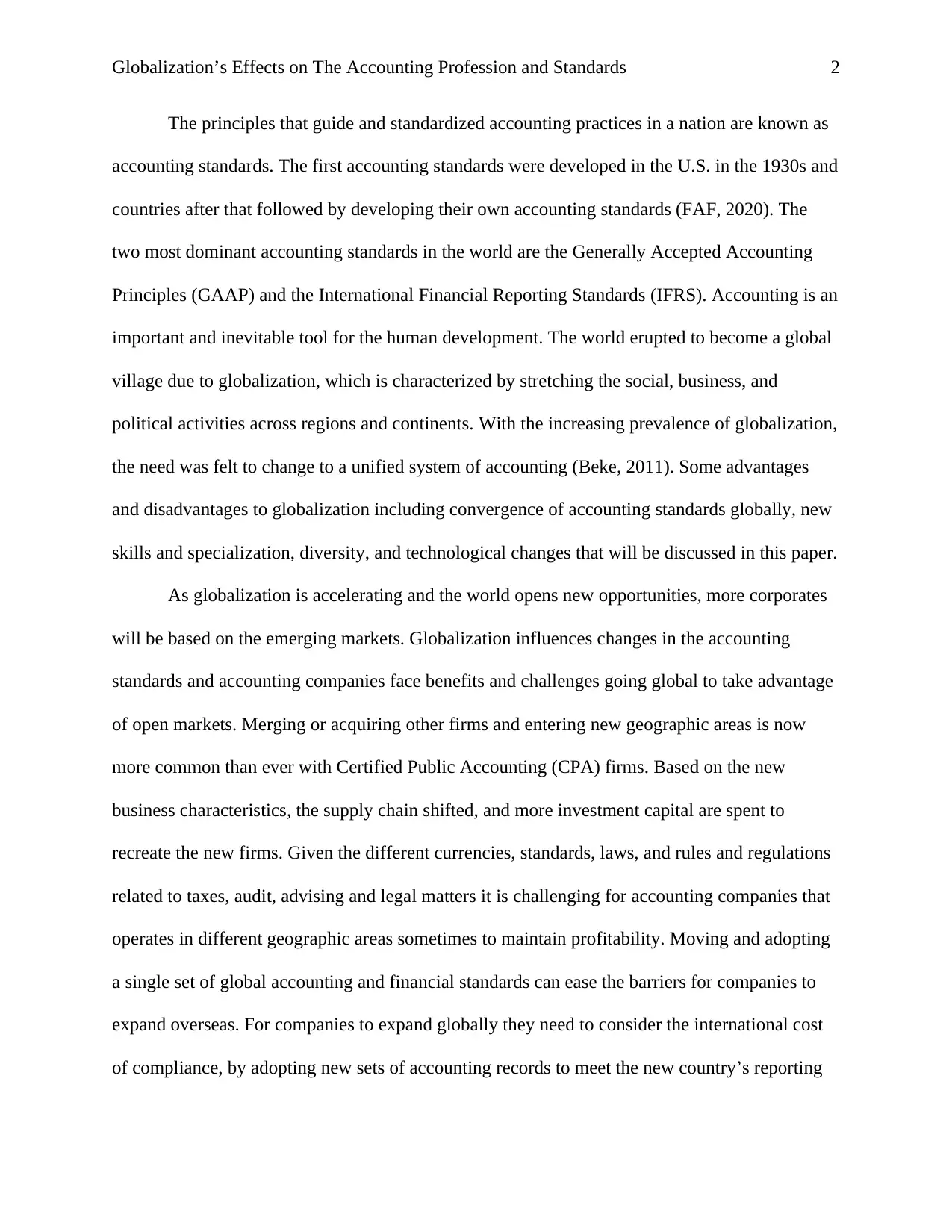
Globalization’s Effects on The Accounting Profession and Standards 2
The principles that guide and standardized accounting practices in a nation are known as
accounting standards. The first accounting standards were developed in the U.S. in the 1930s and
countries after that followed by developing their own accounting standards (FAF, 2020). The
two most dominant accounting standards in the world are the Generally Accepted Accounting
Principles (GAAP) and the International Financial Reporting Standards (IFRS). Accounting is an
important and inevitable tool for the human development. The world erupted to become a global
village due to globalization, which is characterized by stretching the social, business, and
political activities across regions and continents. With the increasing prevalence of globalization,
the need was felt to change to a unified system of accounting (Beke, 2011). Some advantages
and disadvantages to globalization including convergence of accounting standards globally, new
skills and specialization, diversity, and technological changes that will be discussed in this paper.
As globalization is accelerating and the world opens new opportunities, more corporates
will be based on the emerging markets. Globalization influences changes in the accounting
standards and accounting companies face benefits and challenges going global to take advantage
of open markets. Merging or acquiring other firms and entering new geographic areas is now
more common than ever with Certified Public Accounting (CPA) firms. Based on the new
business characteristics, the supply chain shifted, and more investment capital are spent to
recreate the new firms. Given the different currencies, standards, laws, and rules and regulations
related to taxes, audit, advising and legal matters it is challenging for accounting companies that
operates in different geographic areas sometimes to maintain profitability. Moving and adopting
a single set of global accounting and financial standards can ease the barriers for companies to
expand overseas. For companies to expand globally they need to consider the international cost
of compliance, by adopting new sets of accounting records to meet the new country’s reporting
The principles that guide and standardized accounting practices in a nation are known as
accounting standards. The first accounting standards were developed in the U.S. in the 1930s and
countries after that followed by developing their own accounting standards (FAF, 2020). The
two most dominant accounting standards in the world are the Generally Accepted Accounting
Principles (GAAP) and the International Financial Reporting Standards (IFRS). Accounting is an
important and inevitable tool for the human development. The world erupted to become a global
village due to globalization, which is characterized by stretching the social, business, and
political activities across regions and continents. With the increasing prevalence of globalization,
the need was felt to change to a unified system of accounting (Beke, 2011). Some advantages
and disadvantages to globalization including convergence of accounting standards globally, new
skills and specialization, diversity, and technological changes that will be discussed in this paper.
As globalization is accelerating and the world opens new opportunities, more corporates
will be based on the emerging markets. Globalization influences changes in the accounting
standards and accounting companies face benefits and challenges going global to take advantage
of open markets. Merging or acquiring other firms and entering new geographic areas is now
more common than ever with Certified Public Accounting (CPA) firms. Based on the new
business characteristics, the supply chain shifted, and more investment capital are spent to
recreate the new firms. Given the different currencies, standards, laws, and rules and regulations
related to taxes, audit, advising and legal matters it is challenging for accounting companies that
operates in different geographic areas sometimes to maintain profitability. Moving and adopting
a single set of global accounting and financial standards can ease the barriers for companies to
expand overseas. For companies to expand globally they need to consider the international cost
of compliance, by adopting new sets of accounting records to meet the new country’s reporting
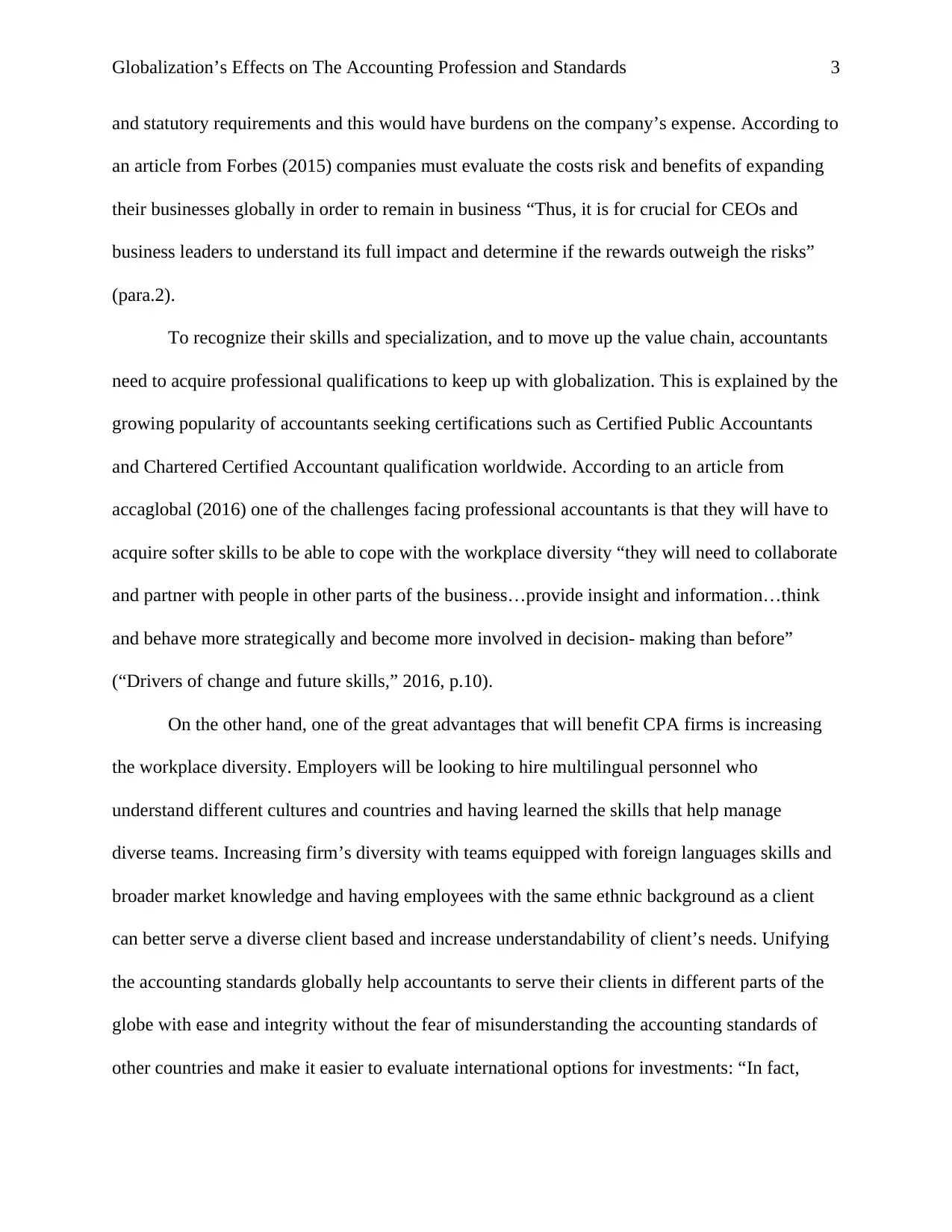
Globalization’s Effects on The Accounting Profession and Standards 3
and statutory requirements and this would have burdens on the company’s expense. According to
an article from Forbes (2015) companies must evaluate the costs risk and benefits of expanding
their businesses globally in order to remain in business “Thus, it is for crucial for CEOs and
business leaders to understand its full impact and determine if the rewards outweigh the risks”
(para.2).
To recognize their skills and specialization, and to move up the value chain, accountants
need to acquire professional qualifications to keep up with globalization. This is explained by the
growing popularity of accountants seeking certifications such as Certified Public Accountants
and Chartered Certified Accountant qualification worldwide. According to an article from
accaglobal (2016) one of the challenges facing professional accountants is that they will have to
acquire softer skills to be able to cope with the workplace diversity “they will need to collaborate
and partner with people in other parts of the business…provide insight and information…think
and behave more strategically and become more involved in decision- making than before”
(“Drivers of change and future skills,” 2016, p.10).
On the other hand, one of the great advantages that will benefit CPA firms is increasing
the workplace diversity. Employers will be looking to hire multilingual personnel who
understand different cultures and countries and having learned the skills that help manage
diverse teams. Increasing firm’s diversity with teams equipped with foreign languages skills and
broader market knowledge and having employees with the same ethnic background as a client
can better serve a diverse client based and increase understandability of client’s needs. Unifying
the accounting standards globally help accountants to serve their clients in different parts of the
globe with ease and integrity without the fear of misunderstanding the accounting standards of
other countries and make it easier to evaluate international options for investments: “In fact,
and statutory requirements and this would have burdens on the company’s expense. According to
an article from Forbes (2015) companies must evaluate the costs risk and benefits of expanding
their businesses globally in order to remain in business “Thus, it is for crucial for CEOs and
business leaders to understand its full impact and determine if the rewards outweigh the risks”
(para.2).
To recognize their skills and specialization, and to move up the value chain, accountants
need to acquire professional qualifications to keep up with globalization. This is explained by the
growing popularity of accountants seeking certifications such as Certified Public Accountants
and Chartered Certified Accountant qualification worldwide. According to an article from
accaglobal (2016) one of the challenges facing professional accountants is that they will have to
acquire softer skills to be able to cope with the workplace diversity “they will need to collaborate
and partner with people in other parts of the business…provide insight and information…think
and behave more strategically and become more involved in decision- making than before”
(“Drivers of change and future skills,” 2016, p.10).
On the other hand, one of the great advantages that will benefit CPA firms is increasing
the workplace diversity. Employers will be looking to hire multilingual personnel who
understand different cultures and countries and having learned the skills that help manage
diverse teams. Increasing firm’s diversity with teams equipped with foreign languages skills and
broader market knowledge and having employees with the same ethnic background as a client
can better serve a diverse client based and increase understandability of client’s needs. Unifying
the accounting standards globally help accountants to serve their clients in different parts of the
globe with ease and integrity without the fear of misunderstanding the accounting standards of
other countries and make it easier to evaluate international options for investments: “In fact,
⊘ This is a preview!⊘
Do you want full access?
Subscribe today to unlock all pages.

Trusted by 1+ million students worldwide
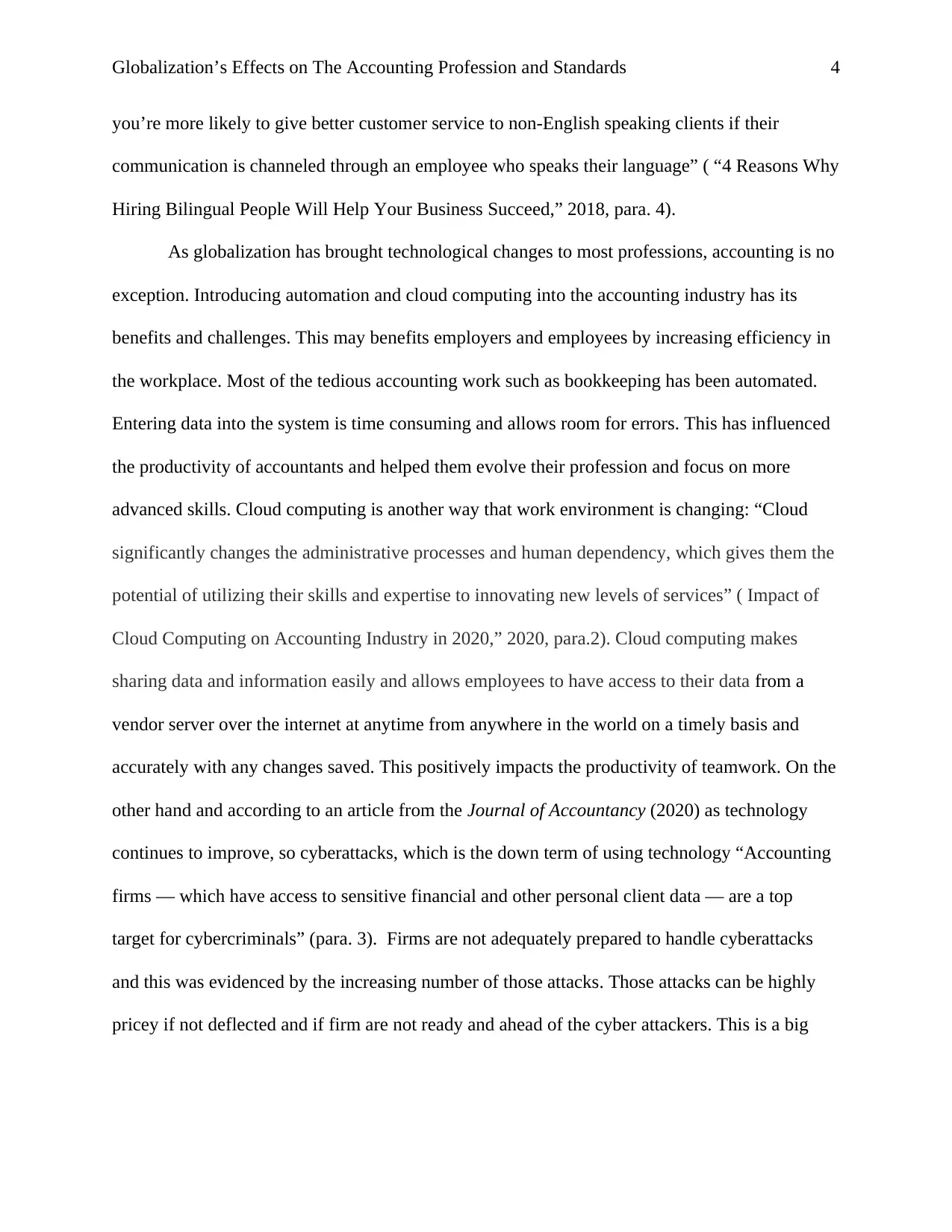
Globalization’s Effects on The Accounting Profession and Standards 4
you’re more likely to give better customer service to non-English speaking clients if their
communication is channeled through an employee who speaks their language” ( “4 Reasons Why
Hiring Bilingual People Will Help Your Business Succeed,” 2018, para. 4).
As globalization has brought technological changes to most professions, accounting is no
exception. Introducing automation and cloud computing into the accounting industry has its
benefits and challenges. This may benefits employers and employees by increasing efficiency in
the workplace. Most of the tedious accounting work such as bookkeeping has been automated.
Entering data into the system is time consuming and allows room for errors. This has influenced
the productivity of accountants and helped them evolve their profession and focus on more
advanced skills. Cloud computing is another way that work environment is changing: “Cloud
significantly changes the administrative processes and human dependency, which gives them the
potential of utilizing their skills and expertise to innovating new levels of services” ( Impact of
Cloud Computing on Accounting Industry in 2020,” 2020, para.2). Cloud computing makes
sharing data and information easily and allows employees to have access to their data from a
vendor server over the internet at anytime from anywhere in the world on a timely basis and
accurately with any changes saved. This positively impacts the productivity of teamwork. On the
other hand and according to an article from the Journal of Accountancy (2020) as technology
continues to improve, so cyberattacks, which is the down term of using technology “Accounting
firms — which have access to sensitive financial and other personal client data — are a top
target for cybercriminals” (para. 3). Firms are not adequately prepared to handle cyberattacks
and this was evidenced by the increasing number of those attacks. Those attacks can be highly
pricey if not deflected and if firm are not ready and ahead of the cyber attackers. This is a big
you’re more likely to give better customer service to non-English speaking clients if their
communication is channeled through an employee who speaks their language” ( “4 Reasons Why
Hiring Bilingual People Will Help Your Business Succeed,” 2018, para. 4).
As globalization has brought technological changes to most professions, accounting is no
exception. Introducing automation and cloud computing into the accounting industry has its
benefits and challenges. This may benefits employers and employees by increasing efficiency in
the workplace. Most of the tedious accounting work such as bookkeeping has been automated.
Entering data into the system is time consuming and allows room for errors. This has influenced
the productivity of accountants and helped them evolve their profession and focus on more
advanced skills. Cloud computing is another way that work environment is changing: “Cloud
significantly changes the administrative processes and human dependency, which gives them the
potential of utilizing their skills and expertise to innovating new levels of services” ( Impact of
Cloud Computing on Accounting Industry in 2020,” 2020, para.2). Cloud computing makes
sharing data and information easily and allows employees to have access to their data from a
vendor server over the internet at anytime from anywhere in the world on a timely basis and
accurately with any changes saved. This positively impacts the productivity of teamwork. On the
other hand and according to an article from the Journal of Accountancy (2020) as technology
continues to improve, so cyberattacks, which is the down term of using technology “Accounting
firms — which have access to sensitive financial and other personal client data — are a top
target for cybercriminals” (para. 3). Firms are not adequately prepared to handle cyberattacks
and this was evidenced by the increasing number of those attacks. Those attacks can be highly
pricey if not deflected and if firm are not ready and ahead of the cyber attackers. This is a big
Paraphrase This Document
Need a fresh take? Get an instant paraphrase of this document with our AI Paraphraser
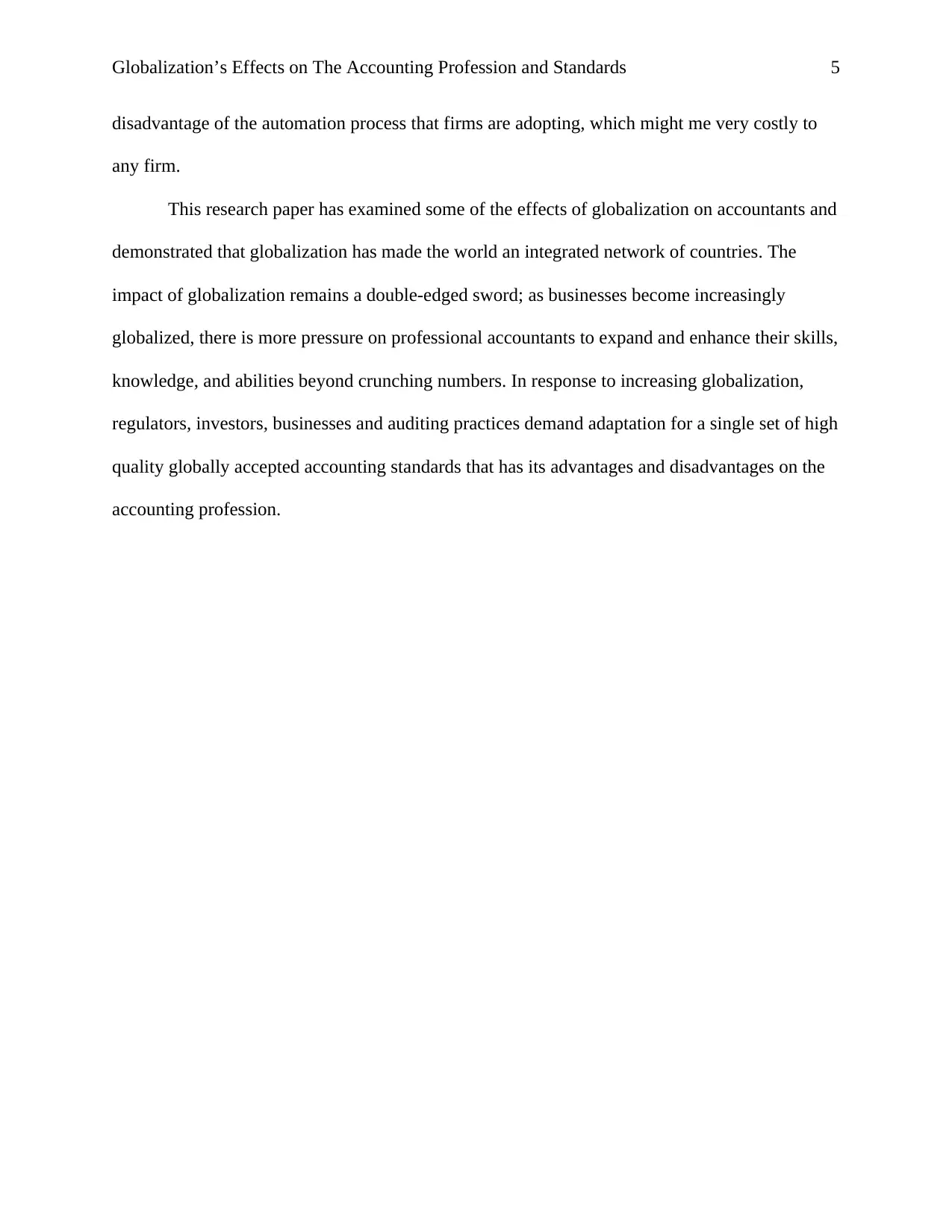
Globalization’s Effects on The Accounting Profession and Standards 5
disadvantage of the automation process that firms are adopting, which might me very costly to
any firm.
This research paper has examined some of the effects of globalization on accountants and
demonstrated that globalization has made the world an integrated network of countries. The
impact of globalization remains a double-edged sword; as businesses become increasingly
globalized, there is more pressure on professional accountants to expand and enhance their skills,
knowledge, and abilities beyond crunching numbers. In response to increasing globalization,
regulators, investors, businesses and auditing practices demand adaptation for a single set of high
quality globally accepted accounting standards that has its advantages and disadvantages on the
accounting profession.
disadvantage of the automation process that firms are adopting, which might me very costly to
any firm.
This research paper has examined some of the effects of globalization on accountants and
demonstrated that globalization has made the world an integrated network of countries. The
impact of globalization remains a double-edged sword; as businesses become increasingly
globalized, there is more pressure on professional accountants to expand and enhance their skills,
knowledge, and abilities beyond crunching numbers. In response to increasing globalization,
regulators, investors, businesses and auditing practices demand adaptation for a single set of high
quality globally accepted accounting standards that has its advantages and disadvantages on the
accounting profession.
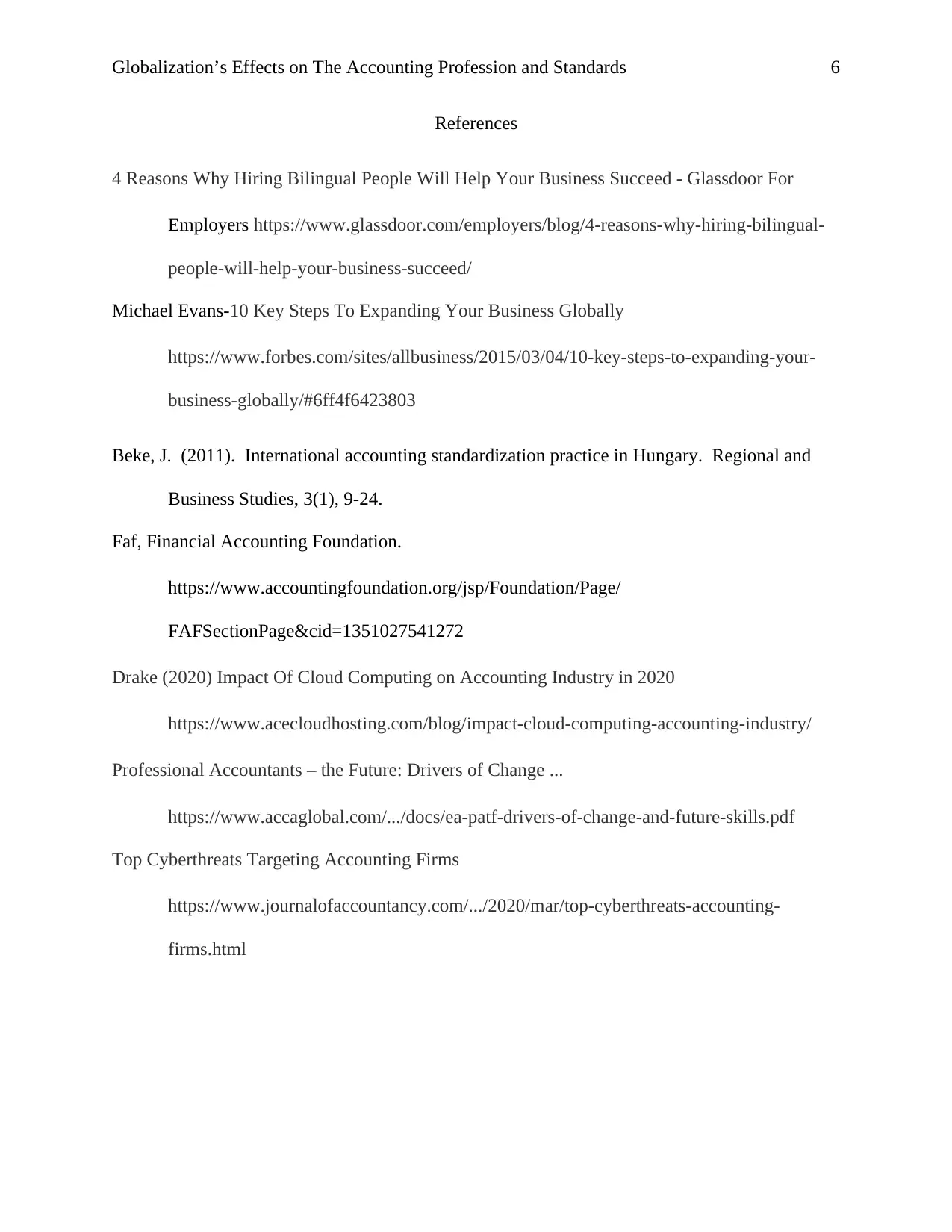
Globalization’s Effects on The Accounting Profession and Standards 6
References
4 Reasons Why Hiring Bilingual People Will Help Your Business Succeed - Glassdoor For
Employers https://www.glassdoor.com/employers/blog/4-reasons-why-hiring-bilingual-
people-will-help-your-business-succeed/
Michael Evans-10 Key Steps To Expanding Your Business Globally
https://www.forbes.com/sites/allbusiness/2015/03/04/10-key-steps-to-expanding-your-
business-globally/#6ff4f6423803
Beke, J. (2011). International accounting standardization practice in Hungary. Regional and
Business Studies, 3(1), 9-24.
Faf, Financial Accounting Foundation.
https://www.accountingfoundation.org/jsp/Foundation/Page/
FAFSectionPage&cid=1351027541272
Drake (2020) Impact Of Cloud Computing on Accounting Industry in 2020
https://www.acecloudhosting.com/blog/impact-cloud-computing-accounting-industry/
Professional Accountants – the Future: Drivers of Change ...
https://www.accaglobal.com/.../docs/ea-patf-drivers-of-change-and-future-skills.pdf
Top Cyberthreats Targeting Accounting Firms
https://www.journalofaccountancy.com/.../2020/mar/top-cyberthreats-accounting-
firms.html
References
4 Reasons Why Hiring Bilingual People Will Help Your Business Succeed - Glassdoor For
Employers https://www.glassdoor.com/employers/blog/4-reasons-why-hiring-bilingual-
people-will-help-your-business-succeed/
Michael Evans-10 Key Steps To Expanding Your Business Globally
https://www.forbes.com/sites/allbusiness/2015/03/04/10-key-steps-to-expanding-your-
business-globally/#6ff4f6423803
Beke, J. (2011). International accounting standardization practice in Hungary. Regional and
Business Studies, 3(1), 9-24.
Faf, Financial Accounting Foundation.
https://www.accountingfoundation.org/jsp/Foundation/Page/
FAFSectionPage&cid=1351027541272
Drake (2020) Impact Of Cloud Computing on Accounting Industry in 2020
https://www.acecloudhosting.com/blog/impact-cloud-computing-accounting-industry/
Professional Accountants – the Future: Drivers of Change ...
https://www.accaglobal.com/.../docs/ea-patf-drivers-of-change-and-future-skills.pdf
Top Cyberthreats Targeting Accounting Firms
https://www.journalofaccountancy.com/.../2020/mar/top-cyberthreats-accounting-
firms.html
⊘ This is a preview!⊘
Do you want full access?
Subscribe today to unlock all pages.

Trusted by 1+ million students worldwide
1 out of 6
Related Documents
Your All-in-One AI-Powered Toolkit for Academic Success.
+13062052269
info@desklib.com
Available 24*7 on WhatsApp / Email
![[object Object]](/_next/static/media/star-bottom.7253800d.svg)
Unlock your academic potential
Copyright © 2020–2026 A2Z Services. All Rights Reserved. Developed and managed by ZUCOL.




